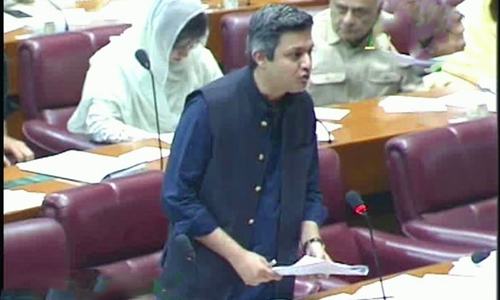ISLAMABAD: The government is expecting final passage from the National Assembly of the Finance Bill 2019-20 on Friday (today), after which the next stop will be the International Monetary Fund (IMF) board meeting, which is currently scheduled for July 3.
The final budget measures passed by the assembly along with a report on compliance with all prior actions will be key elements in the board’s decision to grant Pakistan’s request for accession to a $6 billion bailout facility. The final, approved version of the budget and finance bill are expected to be transmitted to the Fund by Monday, a senior government official familiar with the process told Dawn.
“Completion of all prior actions has paved the way for the board meeting on third of July. Sharing of budget approved by the parliament was one of the prior actions,” said a senior official of the ministry of finance on condition of not being named in view of the board meeting’s sensitivity. He said the budget approval was the final thing for Pakistan to deliver before the IMF meeting. “The latest exchange rate, SBP policy rate, electricity and gas rates and budget approval were the key prior actions,” the official said.
Govt expects NA to pass finance bill today
Officials said the Memorandum of Economic and Financial Policies (MEFP) had already been transmitted to the IMF in line with the staff level agreement reached on May 12. Pakistan will remain committed throughout the 39-month programme period to what the State Bank calls a “market determined exchange rate”. However, if at any stage the central bank comes across reasonable evidence to suggest artificial exchange rate manipulation by outside factors, it will be free to intervene, a senior official said.
Also, the State Bank of Pakistan will maintain the current gap between its policy rate and the rate of inflation all along. At no time, and in any circumstances the difference between policy rate and inflation would not be allowed to fall below 1.5pc. That would mean the policy rate will stay 1.5pc higher than inflation even in extreme circumstances. At present, the core inflation stands at about 7.2pc, general rate of inflation measured by consumer price index at 9.1pc and policy rate at 12.25pc. State Bank sources tell Dawn that usual practice is to look at projected inflation rather than today’s inflation rate when deciding the policy rate. As per budget documents, projected inflation all through next fiscal year can be as high as 13pc.
The finance ministry officials said the revenue target of Rs5.550 trillion announced in the budget was not as sacrosanct this time as it used to be under previous programmes as long as the Federal Board of Revenue clearly demonstrates with its genuine efforts and actions that tax base was actually expanding, tax exemptions declining and new taxpayers coming in. “The tax target could be relaxed” an official said.
They said the increase in energy prices – both natural gas (about 25pc) and electricity (about 12pc) – have been approved by the relevant forums and would become legally effective on July 1. Going forward, the government will remain committed to make further tariff adjustments as and when it falls short of meeting its recovery targets.
Pakistan reached a staff level agreement with the IMF on May 12 under which authorities announced over Rs1.4trillion worth of revenue adjustments through federal budget 2019-20. The IMF announced at the time that the “forthcoming budget for FY2019-20 is a first critical step in the authorities’ fiscal strategy” that will aim for a primary deficit of 0.6pc of GDP supported by tax policy revenue mobilization measures to eliminate exemptions, curtail special treatments and improve tax administration. The primary deficit is what the current fund program is focused on, it measures the difference between taxes and expenditures after taking out debt service payments.
The government agreed under the programme to increase energy prices, generate more taxes, introduce a market determined exchange rate, allow central bank’s full operational independence and focus on inflation instead of growth. Also, the provinces would have to create more cash surpluses to support federal governments’ fiscal stability.
During next fiscal year year beginning July 1, Pakistan will have to generate additional tax revenues of about Rs700bn, raise about Rs189bn from power consumers, generate about Rs150bn through gas price hike, privatize at least two power LNG plants worth over Rs280bn ($2b) and stop hemorrhaging of other public sector entities.
The government has given a commitment to reduce flow of circular debt to zero by December 31, 2020 and financing old circular debt stock through privatisation process and fresh Islamic bonds.
Adviser to Prime Minister on Finance Dr Hafeez Shaikh has been saying that approval of IMF package by its board will help revive flow of $2-3bn per annum from the World Bank and the Asian Development Bank, improve Pakistan’s debt situation and send a positive signal to the world markets at the time of launch of international bonds later next year.
Published in Dawn, June 28th, 2019














































